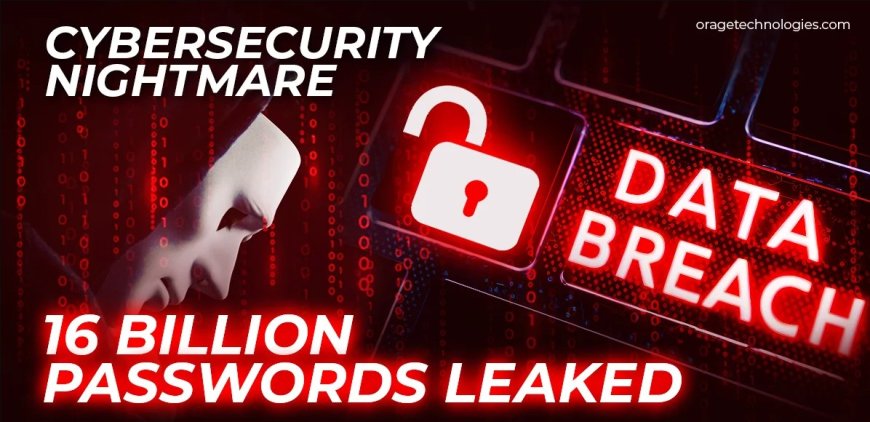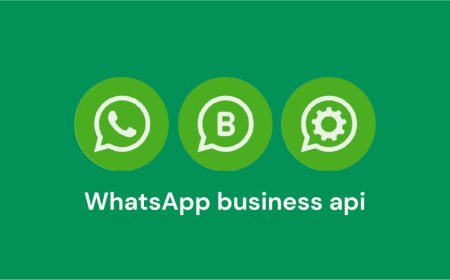Cybersecurity Nightmare: 16 Billion Passwords Leaked in Data Breach
Discover the full story behind the 16 billion-password data breach affecting millions worldwide. Learn who’s impacted, how to protect yourself, and what this means for online security.


In a startling cybersecurity incident, more than 16 billion passwords have been exposed online, causing waves of fear around the world. This record-breaking data breach is among the biggest in the world's history, and it should be an eye-opener for citizens, companies, and governments. With cyber threats advancing every day, proper online security has never been more imperative.
What Happened?
In early 2025, CyberInt and Have I Been Pwned security researchers found a huge collection of login credentials on a dark web forum. Nicknamed the "Mother of All Breaches" (MOAB), this data breach contains information from previous large breaches as well as freshly hacked accounts. The data dump contains usernames, email addresses, and a staggering quantity of passwords in plain text form.
The compromised information seems to be a compilation of various little data breach incidents over the years, sewn together in one giant mega-breach. It is thought by experts that both individual people and multinational organizations have been hit.
Size of the Data Breach
The size of this data breach is unparalleled. To give this some perspective:
- 16 billion individual passwords were discovered.
- The information covers almost 20 years of breaches.
- The leak includes information from well-known platforms such as LinkedIn, Twitter (now X), Dropbox, Adobe, and many more.
This type of data breach poses a severe threat to cybersecurity, as it provides cybercriminals with a treasure trove of login credentials they can exploit.
Who Is Affected?
Essentially, anyone who has had an online account in the past two decades could be at risk. The data breach includes accounts from various industries:
- Social media platforms
- E-commerce websites
- Financial institutions
- Healthcare providers
- Educational portals
Whether youre a casual internet user or a business executive, this data breach should be taken seriously.
The Cybercriminals' Playground
With billions of credentials available, hackers can:
- Launch credential stuffing attacks to gain unauthorized access.
- Sell credentials on the dark web.
- Use personal data for identity theft.
- Spread malware using compromised accounts.
This breach has heightened the risk of phishing attacks and ransomware threats. It also reveals how exposed our online lives have been.
How to Check if You Were Impacted
Some sites, including "Have I Been Pwned" and "Firefox Monitor," enable you to determine whether your email or password was breached in a data breach. If your login credentials show up in the leaked database, act fast.
Steps to Protect Yourself After Data Breach
- Immediately Change Passwords: Create strong, distinct passwords for every account.
- Activate Two-Factor Authentication (2FA): Provides an added layer of protection.
- Use a Password Manager: Software such as LastPass or 1Password create and remember complicated passwords.
- Keep an Eye on Your Accounts: Check for suspicious behavior.
- Watch Out for Phishing Emails: Do not click on unfamiliar links or attachments.
Being proactive can minimize the consequences related to this data breach.
Corporate and Government Response
Governments and institutions globally are probing the source of the data breach. The U.S. Cybersecurity and Infrastructure Security Agency has issued notices to the public and private sectors. Technology companies are asking users to reset their passwords and check security settings on their accounts.
The Significance of Cyber Hygiene
This breach is a reminder that cybersecurity isn't an IT issueit's everybody's issue. Simple cyber hygiene habits like frequent password resets, software patching, and employee training can make a big difference in preventing breaches.
Future Implications
The MOAB has created a new standard for data breach size. It can contribute to stronger data privacy regulations and more stringent enforcement. Businesses that do not safeguard user data will be hit with steep fines under laws such as GDPR and CCPA.
Final Thoughts
The 16 billion-password hack is a harsh reminder of our online vulnerabilities. As the personal and professional lives of people are becoming more and more online, it's crucial to remain cautious. Seize this opportunity to rethink your cybersecurity plan and guard yourself against upcoming threats.






































